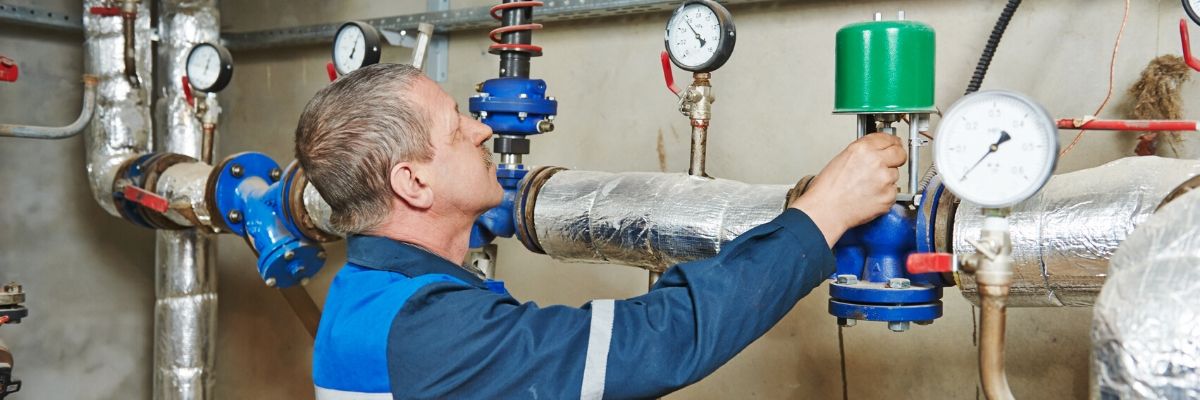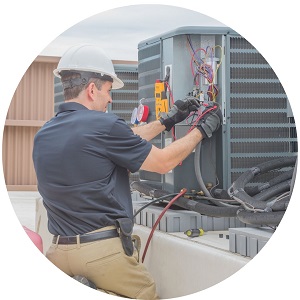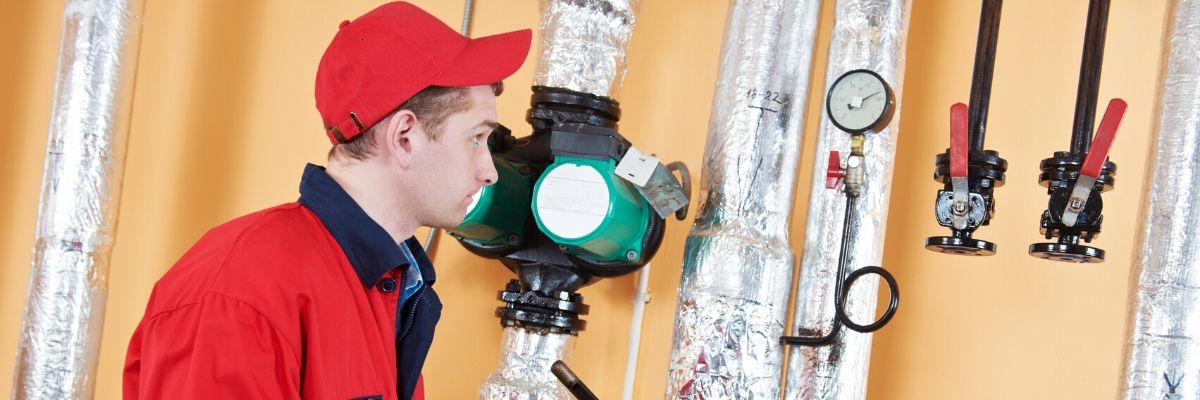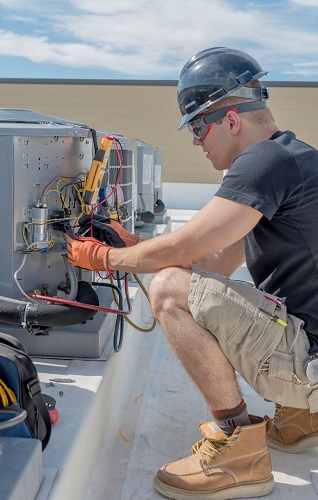HVAC Insurance Types, and Benefits

Working in the HVAC industry can be a profitable business, especially if you’re running your own small company. If you’ve already put in the effort to become an HVAC contractor, you probably want to put every effort into making your trade successful.
However, you can’t just rely on your technical skills, no matter how good they’re. You also need to ensure that you have the proper HVAC contractor insurance. Insurance protects your small business and enables you to work with confidence, but choosing the right insurance can be a challenge.
What is HVAC Insurance?
HVAC insurance is related to general liability insurance, differencing itself by providing areas of coverage specific to air conditioning and heating installation as well as maintenance. While it’s unlikely that a client or third-party can get injured during an installation or maintenance procedure, the consequences of sloppy work can cause health issues or structural damage that your business may be liable for if you’re not insured.
What Does It Cover?
According to the policy you have in place, and which provider you opt for, this insurance can protect against costs related to everything including:
- Damage to furniture caused by dropping a power tool;
- Installation issues due to faulty hardware;
- Moisture buildup thanks to poor ventilation;
- An employee that slips and falls off a roof throughout installation;
- The salary of an injured worker who can’t return to the job;
- A customer who accidentally cuts themselves on worker’s sheet metal;
- A lawsuit from a pedestrian who was struck by your company car;
- Automotive repairs following a vehicle accident;
- Replacing HVAC tools lost in a disaster.

Why Do I Need HVAC Insurance?
As an HVAC contractor, you understand the risks that exist when you provide a service, work on someone else’s property, perform physical work with tools, and execute a skilled job. No matter how careful you’re or how advanced your skills are, accidents and mistakes can happen. In addition to events where something goes wrong, this insurance also gives you the ability to prove your professionalism to the customers.
Once you’ve taken care of your insurance, you’ll be able to transfer all energy on the job, and landing the big contract for your company.
How Much Does It Cost?
No two businesses are the same, so you can expect your HVAC coverage cost to vary from other air and heating companies. Common aspects that influence cost include HVAC insurance claims history, coverage needs, and level of exposure, etc.
Several elements will have an impact on insurance costs, such as:
- Heating, ventilation, and air conditioning installation services provided;
- Business equipment and property;
- Revenue;
- Number of employees;
- Location.
Who Should Have HVAC Insurance?
Do you make repairs to heating or cooling systems? Do you install new HVAC units for businesses or private residences? Here are some of the businesses which may need this insurance:
- Cooling and heating services;
- Handyman services;
- Plumbing services;
- Building contractors;
- Business who subcontract HVAC work;
- Electrical contractors;
- Home renovation contractors.

What Types of Coverage do HVAC Contractors and Installers Need?
These policies provide insurance for the most common risks of HVAC installation.
General liability insurance
This policy covers common HVAC installation risks, like damage to a client’s home while carrying heavy equipment. Package with property insurance for savings in a BOP. It’s ideal for customer property damage, customer injuries, and slander or libel lawsuits.
Workers’ compensation insurance
This is required in almost every state for HVAC businesses with employees. It covers medical bills for work-related injuries, and it’s perfect for employee medical expenses, legal costs, and missed wages.
Commercial auto insurance
Car policy covers property damage and injuries, including HVAC company vehicles, as well as repairs to cars damaged by vandalism or weather. It’s recommended for collision coverage and physical damage, injuries caused to another person, and vandalism or theft.
Contractor’s tools and equipment insurance
It covers repair or replacement of an HVAC contractor’s multimeters, psychrometers, and other tools if they’re lost, stolen, or damaged. It’s best for equipment for less than 5 years old, small tools, and mobile equipment.
HVAC Contractor Umbrella Insurance
The liability policies for the HVAC business (general liability, commercial auto, and employer liability) all have coverage limits. Umbrella liability insurance, therefore, is used to increase your liability limits for all of these risks under one policy to protect your company for claims that exceed your primary policy limits.
HVAC Contractor Inland Marine Insurance
It’s a particular type of HVAC insurance policy that protects property while it’s in transit. It means that while you’re driving to a client’s residence or place of business, your property is protected. Any kind of accident or theft can occur between the time you drive to the client’s business or home, as well as when you’re making repairs. If something was to be stolen or damaged, the losses are covered by inland marine coverage.
Surety Bonds
To obtain and maintain licensing, most HVAC contractors need to have at least a $15,000 surety bond. Surety bonds are sold in specialty divisions of insurance agencies but aren’t insurance. In a claim, the bond issuer pays and then recoups the money from the HVAC technician.
State boards use it to protect consumers without creating huge expenses for the licensed craftsman. It’s unlike insurance that needs a more costly premium, and the insurance company pays claims without expecting repayment.
Related Articles
- Top 5 Small Business Insurance Policies You Should Have
- Independent Contractor Insurance 101: Coverage & Requirements
- Handyman Insurance: Meaning, Coverages, and Cost
- Carpenter Insurance 101: Coverages & Cost
- The Things About Workers Compensation Insurance You Should’ve Known Before
- What Are the Types of Insurance Required for a Bakery?
- Everything You Have to Know About Liability Insurance
- Umbrella Insurance – An Extra Coverage from Excessive Costs
HVAC insurance coverage brings many benefits beyond the actual liability protection from claims you can’t afford to pay. It gives the peace of mind necessary to do your work at the highest level and confidently make recommendations. From a business owner’s standpoint, some benefits help you make more money.
Some of the more specific benefits of carrying the proper HVAC business insurance are:
1. Protection from your mistakes
When you’re dealing with ventilation in homes or office buildings, the risk is inevitable. One mistake could lead to damage resulting in thousands of dollars lost. Without insurance, you pay the cost of damages. Using the right insurance coverage protects you from that liability and gives you peace of mind in operating your business.
2. Protection from employee mistakes
Everyone makes mistakes, and employees often don’t have the knowledge or experience that HVAC business owners do. It’s impossible to be with all of your employees all the time. Their mistakes are your liability. Reduce the financial burden with HVAC liability insurance.
3. Helps you get bigger projects
General contractors, building managers, and high-end home clients don’t want to work with anyone who isn’t insured and licensed and may ask to see your COI (certificate of insurance) before they’ll accept your bid on a project. A COI lists all of your liability coverages and the amount of coverage you have for each, so it can act as proof of insurance.
4. Recommendations
Having omissions and errors insurance covers the HVAC company if a recommendation is wrong or professional work isn’t done according to code or safety standards. HVAC liability insurance, specifically professional liability insurance, provides confidence to give customers feedback and recommendations without worrying about the downside.

FAQs
Is HVAC Insurance Mandatory?
State law ultimately determines whether this insurance is mandatory or not. Sometimes general liability insurance isn’t required. However, it’s highly recommended that you obtain HVAC contractors’ insurance regardless. In an accident that’s your fault happens, your assets and reputation are covered – due to this type of specialized general liability.
Does HVAC Contractor Insurance Cover Employees?
Worker’s compensation insurance is a separate policy from contractors’ insurance since the latter insures only third-parties and their property in the event of an accident. Specialized general liability is great at protecting you against libel, slander, or other defamation costs. Anyway, you’ll need to buy worker’s compensation if you want to cover employees that sustain an injury.
What Happens if You Don’t Have HVAC Contractors Insurance?
If not having general liability cover is illegal in the state of your operation, the authorities may fine you for it. Still, in case there’s a serious accident that is your fault, you could finish paying far too much in damages than it’s worth.
What Risks Do HVAC Contractors Face?
Below are some of the typical risks HVAC contractors can have:
- Diagnosis of the air conditioner makes it break down;
- Employee got accidentally electrocuted when one of their tools fell down the power line;
- You’ll be responsible for paying for the employee’s medical fees;
- One of the HVAC contractors failed to perform the contracted task.
One-Stop HVAC Insurance for San Diego
At H&M Agency, we’ve spent years perfecting our HVAC insurance programs to meet the needs of contractors in San Diego and California. Our team of specialists with expertise in all types of contractor insurance, with in-depth knowledge of the risks you face, state, and local regulations, plus leading insurers specializing in HVAC insurance.
If you’re looking for top protection, call us today at (619) 296-0005 and learn more about leading San Diego business insurance. can bring.

